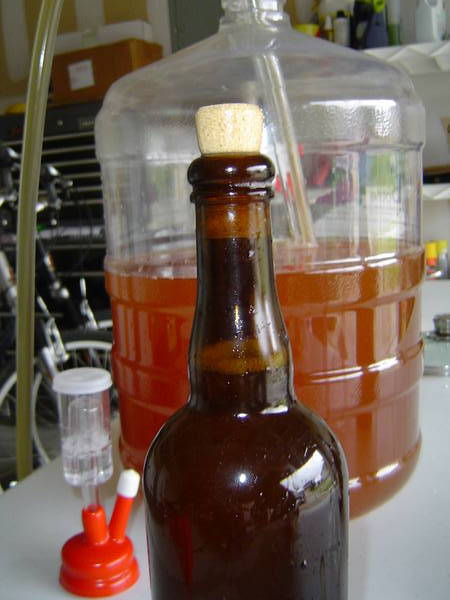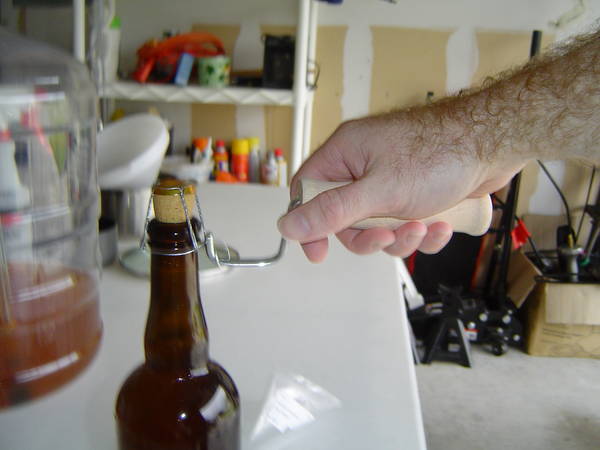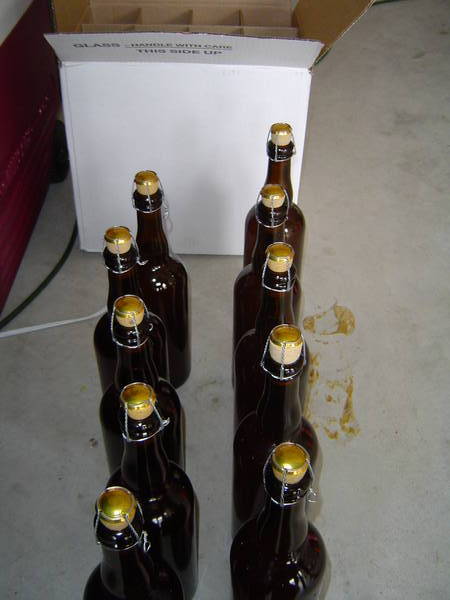I have a Portuguese floor corker and wanted to cork Belgian bottles. I figured it out and figured I'd post a mini-howto here with pics so folks don't have to spend two hours scouring search engines before trying it out.
You'll need a corker (duh). I already have one because I bottle a lot of wine. They are about $70 from LHBS. You can probably borrow one from a buddy if you don't have one. You will also need Belgian beer corks and cages available from LHBS. Not every LHBS will carry them so you may have to buy online. Sanitize the corks with whatever sanitizer you wish before using.
Slip a #6.5 or #7 stopper over the plunger and set the screw stop somewhere around the middle. You can fine tune it later.

Insert the bottle into the corker and push the cork into the Iris (it will be a tight fit since the Belgian corks are wider than the wine corks the corker is designed for). When you press down on the lever to insert the cork, the stopper will stop the plunger leaving about 5/8" of the cork sticking out. When you raise the lever, the cork will still be stuck in the corker so you need to push it out while pulling the bottle down from the corker at the same time -- if you just pull down on the bottle without pushing on the cork, the cork will get pulled out of the bottle and stay stuck in the corker. The handle of a screwdriver works great for pushing on the cork... simply push down on the driver handle with your right hand as you pull the bottle straight down with your left hand. The cork will pop out of the corker without getting pulled back out of the bottle.

Proper cork depth is about an index finger width below where the wire cage attaches to the bottle. Don't worry about being exact, as long as the cage isn't too loose it will fix itself as the bottle carbs and the pressure pushes the cork out until it catches on the cage.

Each cage gets six half twists. This cage tool ($4 from LHBS) makes the job much easier than using a pen.

Last step: admire your work. Those bottles look sexy!

You'll need a corker (duh). I already have one because I bottle a lot of wine. They are about $70 from LHBS. You can probably borrow one from a buddy if you don't have one. You will also need Belgian beer corks and cages available from LHBS. Not every LHBS will carry them so you may have to buy online. Sanitize the corks with whatever sanitizer you wish before using.
Slip a #6.5 or #7 stopper over the plunger and set the screw stop somewhere around the middle. You can fine tune it later.

Insert the bottle into the corker and push the cork into the Iris (it will be a tight fit since the Belgian corks are wider than the wine corks the corker is designed for). When you press down on the lever to insert the cork, the stopper will stop the plunger leaving about 5/8" of the cork sticking out. When you raise the lever, the cork will still be stuck in the corker so you need to push it out while pulling the bottle down from the corker at the same time -- if you just pull down on the bottle without pushing on the cork, the cork will get pulled out of the bottle and stay stuck in the corker. The handle of a screwdriver works great for pushing on the cork... simply push down on the driver handle with your right hand as you pull the bottle straight down with your left hand. The cork will pop out of the corker without getting pulled back out of the bottle.

Proper cork depth is about an index finger width below where the wire cage attaches to the bottle. Don't worry about being exact, as long as the cage isn't too loose it will fix itself as the bottle carbs and the pressure pushes the cork out until it catches on the cage.

Each cage gets six half twists. This cage tool ($4 from LHBS) makes the job much easier than using a pen.

Last step: admire your work. Those bottles look sexy!



